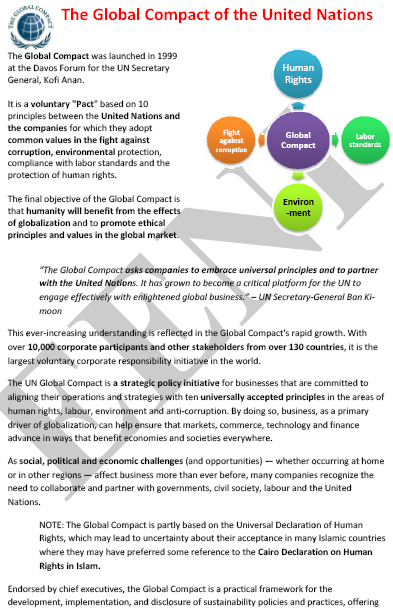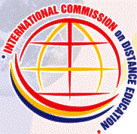Corruption, Global Compact, United Nations

UN Convention Against Corruption. Ten principles (Global Compact)
- Introduction to the Global Compact of the United Nations
- The Ten principles of the Global Compact
- How to join the Global Compact
- Universal Declaration of Human Rights
- ILO Declaration on Fundamental Principles and Rights at Work
- United Nations Convention against Corruption
- Rio Declaration on Environment and Development

The Subject “Global Compact (UN)” is part of
All the Doctorate in International Business.
Course: No to Corruption in international business.
All the Professional Masters of Science in International Business.
Languages:  (or
(or  Pacto Mundial
Pacto Mundial  Pacte Mondial
Pacte Mondial  Pacto Mundial).
Pacto Mundial).

Global Compact of the UN

The Global Compact was launched in 1999 at the Davos Forum by the former UN Secretary-General, Kofi Annan. It is a voluntary “Pact” based on ten principles between the United Nations and companies for which they adopt shared values in the struggle against corruption, environmental protection, compliance with the labour standards and human rights protection.
The final objective of the Global Compact is that the humanity will benefit from the effects of the Globalization and to promote the ethical principles and values in the global market.
The ten principles of the Global Compact are based on:
- Universal Declaration of Human Rights
- Declaration on Fundamental Principles and Rights at Work (International Labour Organization)
- Rio Declaration on Environment and Development
- United Nations Convention against Corruption
NOTE: The Global Compact is partly based on the Universal Declaration of Human Rights, which may lead to uncertainty about their acceptance in many Islamic Countries where they may have preferred some reference to the Cairo Declaration on Human Rights in Islam.
 EENI Global Business School is a member of the International Commission on Distance Learning (ECOSOC United Nations) (INTCODE).
EENI Global Business School is a member of the International Commission on Distance Learning (ECOSOC United Nations) (INTCODE).
(c) EENI Global Business School (1995-2024)
We do not use cookies
Top of this page



